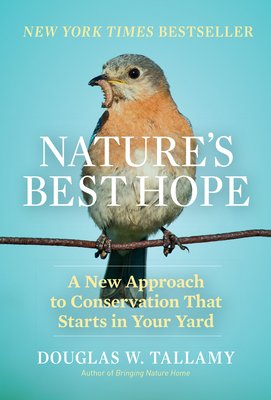Book Clvb!
A little before the beginning of each month I am going to announce the upcoming month’s book. Anyone who wants to read along can send in thoughts and questions to grace@flowerclvb.com and I will share some of the thoughts and comments on the next newsletter.
Nature’s Best Hope
To commence book clvb, I am going to start with Douglas W. Tallamy’s book, Nature’s Best Hope: A New Approach to Conservation that Starts in Your Yard. My biggest take away from his book is the importance of planting native plants in our yards. Native plants help restore natural habitats even in a small way.
Oak-leaf hydrangeas, asters, goldenrod and milkweed are just a few of the plants I plan to incorporate into my garden after reading this book. What I like about Tallamy’s approach is that he does not suggest that you rip out all non-native plants and replace them with native ones. Rather he recommends incorporating plants that serve as homes for insects and food for birds or butterflies that once thrived in the area.
Ditch the Political Arguments for Plants!
Many of us feel very passionately about how we think society should operate based on our own understandings of the world and moral convictions. Often the various approaches and opinions of how we might go about solving the biggest problems of our time lead to divisive arguments that leave friends and families at odds with each other. It seems in many ways that we have forgotten how to listen and dissent in respectful ways. Rather than starting with the big issues, how about we start with our own yards. While we may experience push back, approaching our green space in humility and grace might further serve to unify us.
We’ve all heard the saying, don’t pluck the invasive species out of your neighbor’s yard until first removing that from your own (LOL).
My Yard Evaluation
When I look at my own yard, I realize there is a lot of work to do in terms of creating an environment that is more welcoming to life’s creatures. Recently my neighbor, Todd who works for the Pennsylvania Horticultural Society informed me that the barberry I had planted is an invasive species in our region. I was honestly delighted to hear the news because I hated the prickly plant anyway and was looking for an excuse to rid myself of the thing. While I might not always find delight in the removal of some of my plants, I welcome the confrontation. After some evaluating, here are a few changes I’d like to manifest in order to make my yard more hospitable to the birds and the bees:
Replacing my rose bush with an oak leaf hydrangea
Planting Snowberry to provide food for birds
Adding a bird bath
Making various bee hotels and planting them in dry covered places throughout my yard
Evaluating My Parent’s Yard
As a fun exercise, I have evaluated my parents lawn as well. They live in Texas and I have always been impressed with the natural habitat that surrounds their suburban neighborhood. On any given day you might see a bob cat, snake or hawk while sitting on the back porch. Here are the things that they are doing well!
Good Job Mom and Dad!
Motion Sensor Lights: Having motion sensor lights rather than flood lights that are on all night prevent moths and insects from fatally flocking towards the lights brightness.
Trickling Fountain: At the front of their home, they have a trickling fountain which birds love the sound of and provides a place for them to cool off.
Trees: While I am unsure the specific varieties of trees, They have many trees surrounding their property that provide shade and homes for the animals in their habitat.
Knowing my dad’s taste for certain styles and colors of flowers as well as their need to remain in good graces with their HOA, here are the plants that I would recommend based on what grows well native to their Dallas Suburb:
Milkweed (orange)
Winecup (Pinkish purple)
Southern wood fern
Penstemon- (light mauve)
Russian Sage (lavender)
Become Certified
National Wildelife Federation offers certification for your yard. So after reading Tallamy’s book, evaluate your yard, make the neccessary changes and become certified!




